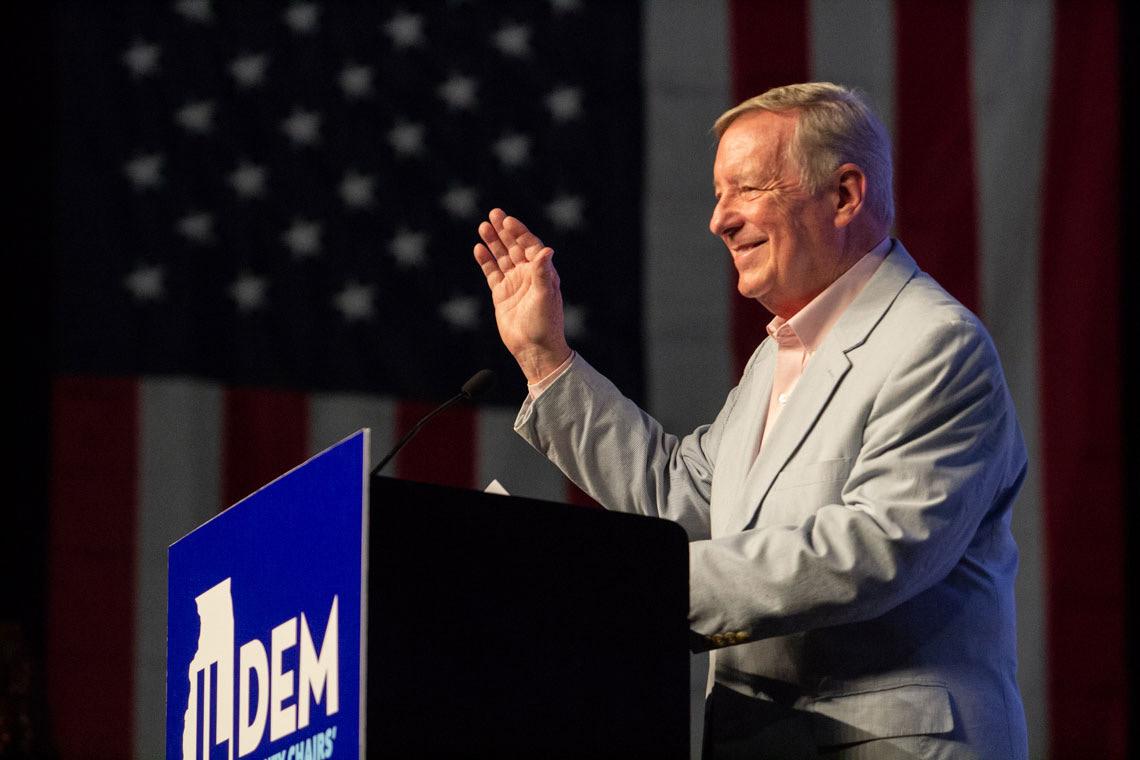






Durbin was among 8 Democratic senators to back plan to reopen federal government
By Ben Szalinski Capitol News Illinois
bszalinski@capitolnewsillinois.com
U.S. Sen. Dick Durbin is once again at odds with other prominent Illinois Democrats over a vote that set in motion a plan to end the record-long federal government shutdown.
Durbin, who is not seeking reelection in 2026, was one of eight members in the Senate Democratic caucus to join Republicans in supporting a procedural vote to begin the process of passing legislation to fund the government, which entered its 41st day without a budget on Monday. But that package will not include health care subsidies that Democrats had demanded be included in a bill to reopen the government.
“Republicans finally woke up and realized their Groundhog Day needed to end,” Durbin said in a statement Sunday night. “This bill is not perfect, but it takes important steps to reduce their shutdown’s hurt. Not only would it fully fund SNAP for the year ahead, but it would reverse the mass firings the Trump Administration ordered throughout the shutdown.”
Senate Democrats believe they secured a promise from Senate Republican leaders to hold a Senate vote on the Affordable Care Act tax credits. The tax credits expire at the end of the year, setting the stage for health care premiums to skyrocket. Congressional Democrats have refused for more than a month to vote for any bill that did not include new health care tax credits to rein in costs.
But many of Illinois’ top Democrats are opposed to the Durbin-backed funding plan. It also marks the second time this year Durbin has found himself at odds with Gov. JB Pritzker over a Senate vote to fund the government.
Pritzker, who is widely discussed as a possible 2028 presidential candidate, said he favors continuing to fight President Donald Trump with a government shutdown, which many Democrats believe gives their party leverage to force Republicans to support funding the ACA subsidies.
“This is not a deal — it’s an empty promise,” Gov. JB Pritzker said on social media. “Trump and his Republican
Congress are making healthcare more expensive for the middle class and ending it for working families. Time for Democrats to stand tall for affordable healthcare.”
Durbin also sided with Republicans in March and voted for the spending plan that kept the government open through September. That triggered outrage from many Democrats who favored shutting down the government at the time to make it harder for Trump to implement his agenda.
Pritzker said in March that Durbin’s decision was a “huge mistake,” and he was “dead wrong.”
The Senate’s vote on Sunday sets the stage for the chamber to pass substantive legislation to fund the government through Jan. 30, but it will require the House’s approval and Trump’s signature first. That timeline remains unclear.
CNN reported the plan would fully fund Supplemental Nutrition Assistance Program benefits through next September and reverses Trump’s firing of federal workers during the shutdown.
Durbin said Republicans own the blame for the shutdown, adding he believes Democrats can claim victory with the vote.
“Now that Democrats secured these wins, it’s time for Leader (John) Thune to keep his promise to schedule a vote on the ACA tax credits in December, and we will see to it that he makes good on his word for the millions of Americans worried they won’t be able to afford health care in January,” Durbin said.
Many, including Illinois Sen. Tammy Duckworth, want congressional Democrats to continue holding out for ACA tax credits.
“I simply cannot, and I will not, vote to do nothing to help protect them (families) from Trump’s vindictive and malicious efforts in exchange for a vague promise from the least trustworthy Republican party in our nation’s history,” Duckworth said in a statement after voting against the procedural vote on Sunday.
U.S. Rep. Sean Casten, a Democrat from Downers Grove, ripped Durbin and the seven other Senate Democrats who sided with Republicans. He said on social media that Democrats “trusting” Republicans on an ACA vote is like “a liar convincing
a sucker.”
“A sucker for believing the lie, and for believing (House Speaker Mike) Johnson will ever bring it up in the House,” he wrote.
The three leading Democrats running to replace Durbin are all opposed to the plan to reopen the government.
“The Republican shutdown has caused immense suffering for Illinois families, and that pain will be compounded exponentially because Democrats let the GOP off the hook,” Lt. Gov. Juliana Stratton said in a statement. “While we all want to see food assistance fully funded and federal workers paid and protected, healthcare for millions of Americans cannot be the tradeoff. An empty promise is not enough.”
Stratton also publicly criticized Durbin’s vote in March.
Reps. Robin Kelly, of Lynwood, and Raja Krishnamoorthi, of Schaumburg, said they will vote against the funding plan whenever it arrives in the House.
“We will not cave to broken promises from Trump and the GOP who have sold the American people a bill of goods on so many things, but especially their access to quality healthcare,” Kelly said in a statement.
Krishnamoorthi said his red line will continue to be whether ACA credits are preserved.
“I lived through more than 50 attempts by Donald Trump in his first term to repeal Obamacare and continued statements that he’s going to gut the Affordable Care Act now,” Krishnamoorthi said in a video statement on Monday. “So I cannot in good conscious believe that all of the sudden he’s going to take actions right now to strengthen Obamacare.”
Illinois has seen escalating impacts from the record government shutdown.
About 2 million people have been stuck in limbo this month over whether they will receive federal food benefits from SNAP. The U.S. Department of Agriculture told states last month that they would not distribute November SNAP benefits as the shutdown continued. Continued on next page
About Us
The Rock River Times has a circulation of 3,500 free newspapers in the Rockford metropolitan area by First Class mail and through commercial outlets. The weekly newspaper is distributed every Wednesday. First-class delivery is $75 for 26 weeks or $140 for 52 weeks. The full version of The Rock River Times is available at rockrivertimes.com Contact Us
Mail: TRRT, PO Box 2, Rockford, IL 61105 | Office: 2510 Charles St., Rockford, IL 61108 | Phone: 815-964-9767 | Fax: 815-964-9825 | E-mail: contact@rockrivertimes.com / legals: legals@rockrivertimes.com | Online: rockrivertimes.com | Office hours: 9 a.m.-3 p.m., Monday-Thursday; 9 a.m.-2 p.m. Friday. Hours may vary.
Copyright Notice
All material herein is the sole property of TRRT, Inc. No reprint, reproduction or other use of any of the materials contained herein is permitted without the consent of the publisher or his duly appointed representative. The Rock River Times is a proud member of the Illinois Press Association.

Whether USDA must use contingency funds to pay full benefits has been an ongoing legal battle in the federal court system since Nov. 1.
Travelers through Chicago’s airports could also see some relief when the government reopens. A growing number of air traffic controllers have called out of work after not getting paid for the last month, leading the Federal Aviation Administration last week to require airlines to cancel flights at 40 airports, including
O’Hare and Midway, because of staffing shortages that cause delays to stack up.
O’Hare was one of the worst airports for delays on Sunday, according to FlightAware, with 16% of departures canceled and 53% delayed.”
Capitol News Illinois is a nonprofit, nonpartisan news service that distributes state government coverage to hundreds of news outlets statewide. It is funded primarily by the Illinois Press Foundation and the Robert R. McCormick Foundation.
Transit Bill
Submitted by RMTD
Public transportation is the lifeline of our community. Every year, Rockford Mass Transit District provides more than 1.3 million rides, connecting residents to work, school, medical care, and local businesses. Reliable transit is critical to supporting our local economy and is
essential infrastructure that keeps the Rockford Region moving.
The Illinois General Assembly’s passage of the Northern Illinois Transit Authority Act (SB 2111) ensures that our region’s transit systems will have a stable, long-term path forward. The new law provides sustainable funding, stronger
oversight, and a statewide commitment to keeping public transportation safe, efficient, clean, dependable and accessible.
On behalf of the RMTD Board, our dedicated staff, and the thousands of riders we serve each day, I want to extend sincere thanks to Rep. Maurice West and Rep. Dave Vella for their leadership and support of
this vital legislation. Their votes reflect an understanding that when public transit succeeds, so does our community. This is a proud moment for Rockford and for all of Northern Illinois - a step toward ensuring that every resident has access to the opportunities that public transportation makes possible.






By Chan Ho-Him Associated Press
HONG KONG (AP) — Vaishnavi Srinivasagopalan, a skilled Indian IT professional who has worked in both India and the U.S., has been looking for work in China. Beijing’s new K-visa program targeting science and technology workers could turn that dream into a reality.
The K-visa rolled out by Beijing last month is part of China’s widening effort to catch up with the U.S. in the race for global talent and cutting edge technology. It coincides with uncertainties over the U.S.’s H-1B program under tightened immigrations policies implemented by President Donald Trump.
“(The) K-visa for China (is) an equivalent to the H-1B for the U.S.,” said Srinivasagopalan, who is intrigued by China’s working environment and culture after her father worked at a Chinese university a few years back. “It is a good option for people like me to work abroad.”
The K-visa supplements China’s existing visa schemes including the R-visa for foreign professionals, but with loosened requirements, such as not requiring an applicant to have a job offer before applying.
Stricter U.S. policies toward foreign students and scholars under Trump, including the raising of fees for the H-1B visa for foreign skilled workers to $100,000 for new applicants, are leading some non-American professionals and students to consider going elsewhere.
“Students studying in the U.S. hoped for an (H-1B) visa, but currently this is an issue,” said Bikash Kali Das, an Indian masters student of international relations at Sichuan University in China.
China is striking while the iron is hot.
The ruling Communist Party has made global leadership in advanced technologies a top priority, paying massive government subsidies to support research and development of areas such as artificial intelligence, semiconductors and robotics.

“Beijing perceives the tightening of immigration policies in the U.S. as an opportunity to position itself globally as welcoming foreign talent and investment more broadly,” said Barbara Kelemen, associate director and head of Asia at
security intelligence firm Dragonfly. Unemployment among Chinese graduates remains high, and competition is intense for jobs in scientific and technical fields. But there is a skills gap China’s leadership is eager to fill. For decades, China has been losing top talent to developed countries as many stayed and worked in the U.S. and Europe after they finished studies there.
The brain drain has not fully reversed.
Many Chinese parents still see Western education as advanced and are eager to send their children abroad, said Alfred Wu, an associate professor at the National University of Singapore.
Still, in recent years, a growing number of professionals including AI experts, scientists and engineers have moved to China from the U.S., including ChineseAmericans. Fei Su, a chip architect at Intel, and Ming Zhou, a leading engineer at U.S.-based software firm Altair, were among those who have taken teaching jobs in China this year.
Many skilled workers in India and Southeast Asia have already expressed interest about the K-visa, said Edward Hu, a Shanghai-based immigration director at the consultancy Newland Chase.
With the jobless rate for Chinese aged 16-24 excluding students at nearly 18%, the campaign to attract more foreign professionals is raising questions.
“The current job market is already under fierce competition,” said Zhou Xinying, a 24-year-old postgraduate student in behavioral science at eastern China’s Zhejiang University.
While foreign professionals could help “bring about new technologies” and different international perspectives, Zhou said, “some Chinese young job seekers may feel pressure due to the introduction of the K-visa policy.”
Kyle Huang, a 26-year-old software engineer based in the southern city of Guangzhou, said his peers in the science and technology fields fear the new visa scheme “might threaten local job opportunities”.
A recent commentary published by a state-backed news outlet, the Shanghai Observer, downplayed such concerns, saying that bringing in such foreign professionals will benefit the economy.
As China advances in areas such as AI and cutting-edge semiconductors, there is a “gap and mismatch” between qualified jobseekers and the demand for skilled workers, it said.
“The more complex the global environment, the more China will open its arms,” it said.
“Beijing will need to emphasize how select foreign talent can create, not take, local jobs,” said Michael Feller, chief strategist at consultancy Geopolitical Strategy. “But even Washington has shown that this is politically a hard argument to make, despite decades of evidence.”
Recruitment and immigration specialists say foreign workers face various hurdles in China. One is the language barrier. The ruling Communist Party’s internet censorship, known as the “Great Firewall,” is another drawback.
A country of about 1.4 billion, China had only an estimated 711,000 foreign workers residing in the country as of 2023.
The U.S. still leads in research and has the advantage of using English widely. There’s also still a relatively clearer pathway to residency for many, said David Stepat, country director for Singapore at the consultancy Dezan Shira & Associates.
Nikhil Swaminathan, an Indian H1-B visa holder working for a U.S. non-profit organization after finishing graduate school there, is interested in China’s K-visa but skeptical. “I would’ve considered it. China’s a great place to work in tech, if not for the difficult relationship between India and China,” he said.
Given a choice, many jobseekers still are likely to aim for jobs in leading global companies outside China.
“The U.S. is probably more at risk of losing would-be H-1B applicants to other Western economies, including the UK and European Union, than to China,” said Feller at Geopolitical Strategy.
“The U.S. may be sabotaging itself, but it’s doing so from a far more competitive position in terms of its attractiveness to talent,” Feller said. “China will need to do far more than offer convenient visa pathways to attract the best.”
AP writer Fu Ting in Washington and researchers Yu Bing and Shihuan Chen in Beijing contributed.
Tagliabue Obituary
By Barry Wilner and Rob Maaddi Associated Press
NEW YORK (AP) — Paul Tagliabue, who helped bring labor peace and riches to the NFL during his 17 years as commissioner but was criticized for not taking stronger action on concussions, died Sunday from heart failure. He was 84.
NFL spokesman Brian McCarthy said Tagliabue’s family informed the league of his death in Chevy Chase, Maryland. Tagliabue, who had developed Parkinson’s disease, was commissioner after Pete Rozelle from 1989 to 2006. He was elected to the Pro Football Hall of Fame as part of a special centennial class in 2020. Current Commissioner Roger Goodell succeeded Tagliabue.
“Paul was the ultimate steward of the game — tall in stature, humble in presence and decisive in his loyalty to the NFL,” Goodell said in a statement. “I am forever grateful and proud to have Paul as my friend and mentor. I cherished the innumerable hours we spent together where he helped shape me as an executive but also as a man, husband and father.”
News of Tagliabue’s death came shortly before seven games kicked off Sunday at 1 p.m. EST. Several teams held moments of silence throughout the day for Tagliabue and Marshawn Kneeland, the Dallas Cowboys defensive tackle who died on Thursday.
Tagliabue oversaw the construction of myriad new stadiums and negotiated television contracts that added billions of dollars to the league’s bank account. Under him, there were no labor stoppages.
During his time, Los Angeles lost two teams and Cleveland another, migrating to Baltimore before being replaced by an expansion franchise. Los Angeles eventually regained two teams.
Tagliabue implemented a policy on substance abuse that was considered the strongest in all major sports. He also established the “Rooney Rule,” in which all teams with coaching vacancies must interview minority candidates. It has since been expanded to include front-office and league executive positions.
When he took office in 1989, the NFL had just hired its first Black head coach of the modern era. By the time Tagliabue stepped down in 2006, there were seven minority head coaches in the league.
In one of his pivotal moments, Tagliabue called off NFL games the weekend after the terrorist attacks of
Sept. 11, 2001. It was one of the few times the public compared him favorably to Rozelle, who proceeded with the games two days after President John Kennedy was assassinated on Nov. 22, 1963. A key presidential aide had advised Rozelle that the NFL should play, a decision that was one of the commissioner’s great regrets.
Tagliabue certainly had his detractors, notably over concussions. The issue has plagued the NFL for decades, though team owners had a major role in the lack of progress in dealing with head trauma.
In 2017, Tagliabue apologized for remarks he made decades ago about concussions in football, acknowledging he didn’t have the proper data at the time in 1994. He called concussions “one of those pack-journalism issues” and contended the number of concussions “is relatively small; the problem is the journalist issue.”
“Obviously,” he said on Talk of Fame Network, “I do regret those remarks. Looking back, it was not sensible language to use to express my thoughts at the time. My language was intemperate, and it led to a serious misunderstanding.
“My intention at the time was to make a point which could have been made fairly simply: that there was a need for better data. There was a need for more reliable information about concussions and uniformity in terms of how they were being defined in terms of severity.”
While concussion recognition, research and treatment lagged for much of Tagliabue’s tenure, his work on the labor front was exemplary.
As one of his first decisions, Tagliabue reached out to the players’ union, then run by Gene Upshaw, a Hall of Fame player and former star for Al Davis’ Raiders. Tagliabue had insisted he be directly involved in all labor negotiations, basically rendering useless the Management Council of club executives that had handled such duties for nearly two decades.
It was a wise decision.
“When Paul was named commissioner after that seven-month search in 1989, that’s when the league got back on track,” said Joe Browne, who spent 50 years as an NFL executive and was a confidant of Rozelle and Tagliabue.
“Paul had insisted during his negotiations for the position that final control over matters such as labor and all commercial business dealings had to rest
in the commissioner’s office. The owners agreed and that was a large step forward toward the tremendous rebound we had as a league — an expanded league — in the ‘90s and beyond.”
Tagliabue forged a solid relationship with Upshaw. In breaking with the contentious dealings between the league and the NFL Players Association, Tagliabue and Upshaw kept negotiations respectful and centered on what would benefit both sides. Compromise was key, Upshaw always said — although the union often was criticized for being too accommodating.
Tagliabue had been the NFL’s Washington lawyer, a partner in the prestigious firm of Covington & Burling. He was chosen as commissioner in October 1989 over New Orleans general manager Jim Finks after a bitter fight highlighting the differences between the NFL’s old guard and newer owners.
Yet during his reign as commissioner, which ended in the spring of 2006 after pushing through a highly contested labor agreement, he managed to unite those divided owners and, in fact, relied more on the old-timers who supported him than on Jerry Jones and many of the younger owners at the time.
Tagliabue was born on Nov. 24, 1940, in Jersey City, New Jersey. He was the 6-foot-5 captain of the basketball team at Georgetown and graduated in 1962 as one of the school’s leading rebounders at the time — his career average later listed just below that of Patrick Ewing. He was president of his class and a Rhodes scholar finalist. Three years later, he graduated from NYU Law School and subsequently worked as a lawyer in
the Defense Department before joining Covington & Burling.
He eventually took over the NFL account, establishing a close relationship with Rozelle and other league officials during a series of legal actions in the 1970s and 1980s.
Tagliabue was reserved by nature and it sometimes led to coolness with the media, which had embraced Rozelle, an affable former public relations man. Even after he left office, Tagliabue did not measure up in that regard with Goodell, who began his NFL career in the public relations department.
But after 9/11, Tagliabue showed a different side, particularly toward league employees who had lost loved ones in the attacks. He accompanied Ed Tighe, an NFL Management Council lawyer whose wife died that day, to Mass at St. Patrick’s Cathedral, a few blocks from the NFL office.
Art Shell, a Hall of Fame player, became the NFL’s first modern-day Black head coach with the Raiders. He got to see Tagliabue up close and thought him utterly suited for his job.
“After my coaching career was over, I had the privilege of working directly with Paul in the league office,” Shell said. “His philosophy on almost every issue was, ‘If it’s broke, fix it. And if it’s not broke, fix it anyway.’
“He always challenged us to find better ways of doing things. Paul never lost sight of his responsibility to do what was right for the game. He was the perfect choice as NFL commissioner.”
Tagliabue is survived by his wife, Chandler, son Drew and daughter Emily. Areyou55yearsofageorolder? FAUSTLANDMARKAPARTMENTSmaybetheplaceforyou.
• Pllaanned d acctivittiiees
• Trannsporttaattion to grocer r y sttores
the city bus liine
• Clloose to Churchess, shhopping, bankss, and resstauraants
• Laundr y faacillity on siit e
• Beeauty and Baarrber r S Shhop on siite


• Coonceernned Maannagemment & Maiintenance e with 24-hhour emmergenncy mainnteennance e
• Meet t and Eat lunch ser r veed Moonday y thhru u Frriday y (eexcceppt holidayys) )
• H UD subsiidy avaailaable




























